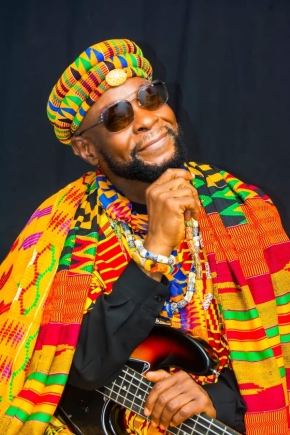Eugene Nene Agyeman Cropper, the multi-talented bassist, singer, arranger, composer, and producer, widely known as Kenteman since the 1980s, has kicked off the new year with fresh music proudly bearing his signature Kentemusic style.
Recognized by many as the brother of the Queen of Highlife, Asabia Cropper, Kenteman has been instrumental in her rise to fame, serving as her mentor and creative force. However, he is much more than a behind-the-scenes figure. Over the years, Kenteman has solidified his status as a remarkable musician and a kente fashion icon in his own right.

One of his upcoming singles, We Wear Kente Colours, is a vibrant, Highlife-inspired track that celebrates his love for kente fashion and music. The song’s lyrics reflect his passion for cultural pride and unity, with lines such as:
“All over the world, people are asking
They want to know why we wear kente…
We wear kente colours to praise the Most High…
We play kentemusic to bring people together…
You have a favourite colour,
And all the colours, they are in kente; inside the kente
So you are inside the kente
Everybody dey inside the kente”
The lyrics emphasize Kenteman’s belief in the power of music to unite people and celebrate cultural identity. To him, music is a universal force that fosters togetherness and pride among people of all backgrounds.
Kenteman’s deep-rooted pride in his Ghanaian heritage and kente fashion spans decades. A 1985 issue of The Mirror newspaper featured an article by arts writer Nanabanyin Dadson that highlighted his iconic connection to kente:
“If you were quizzed about the one musician with whom the kente costume has come to be associated, you would jump to the name Eugenia Asabia Cropper.
But just a moment. There’s a gentleman who also gives a very good portrayal of the indigenous and colourful kente of Ghana. He strums a bass guitar and is often costumed in a kente suit: trouser, vest, coat, and all. His name is Eugene Nene Agyeman Cropper.”
As the original Kenteman, he was a member of the Tema-based Sweet Talks and Black Hustlers bands in the 1970s. In the early 1980s, he collaborated with the Eboni Record label in Côte d’Ivoire, contributing to some of Mory Kanté’s recordings when the Guinean superstar was signed to the label. In 1981, Kenteman arranged and produced Asabia Cropper’s Wamaya album under the management of Disco Stock International in Côte d’Ivoire. Their partnership flourished, earning international acclaim.
One of their greatest achievements came in 1993, when the Union of Radio and Television Networks of Africa (URTNA) honored Kenteman as the King of Kentemusic and named both him and Asabia as Cultural Ambassadors of Africa during the URTNA Awards in Kenya.
Kenteman’s journey through music has been long and impactful. Today, he takes pride in his enduring contributions to Ghanaian and African music, as well as his unwavering dedication to kente fashion, a symbol of cultural pride and unity.

